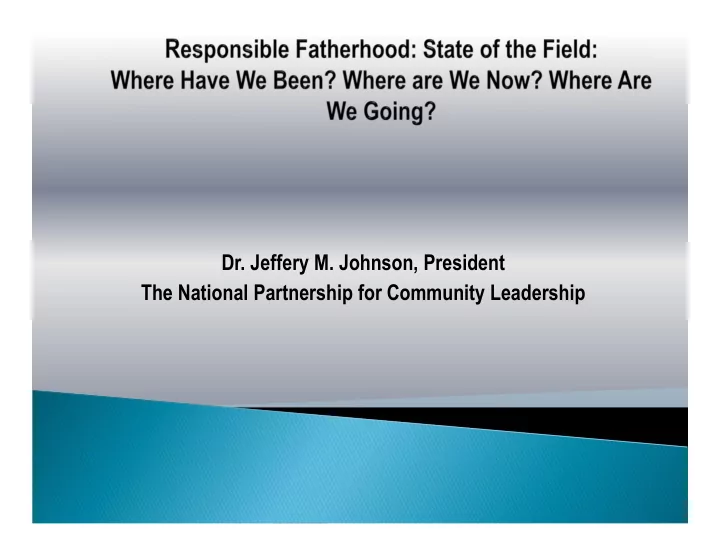

Dr. Jeffery M. Johnson, President The National Partnership for Community Leadership
Charles Ballard, pioneer responsible fatherhood program practitioner in began his work with dads at Cleveland Clinic in 1978 with a focus on infant mortality reduction A large number of fatherhood programs grew out of Healthy Starts focus on men’s health in the early 1990’s The well-being of children and an emphasis on men’s/dads health is a key component of most community based fatherhood today including trauma informed approaches 2
3
Evolving? Disparate? (different in kind, comparisons difficult) Spasmodic? (patchy, irregular, occasional) Driven by public funding? No Uniform Standards? 4
Work in the field The are fatherhood programs in every state and jurisdiction some are being run by volunteers who convene group meetings for dads and others funded by public and private donors There are small number of federally funded fatherhood programs authorized under the 2010 Claims Resolution Act that target low-income non-custodial fathers. These are small, medium and large based on funding levels. Several of the larger projects have been part national evaluation conducted by Mathematica Policy Research A current national evaluation is being conducted by Manpower Demonstration Research Corporation (MDRC) 5
Shift in measurement ◦ Level of effort # of participants enrolled # of classes held ◦ Level effect Impact of intervention on target population, particularly well being of children ◦ Movement away from surrogate outcomes? 6
What is evidence-based fatherhood practice? “the process of systematically reviewing, appraising and using research findings to aid the optimum delivery of services to fathers and their families.” 7
An evidence-based responsible fatherhood education program Is a program model that has been subjected to a rigorous evaluation. Further, the program systematically reviews, critically appraises and uses Research findings to aid the optimum delivery of services to fathers and Their families. It focuses on giving fathers the knowledge and skills to Better understand their social, cultural, economic, legal, and developmental impact on their children. Moreover, the program teaches and encourages fathers to assume personal responsibility for their past, current and future attitudes and behaviors. 8
Responsible fatherhood education programs need more father friendly policy environments at the national, state and local levels. Funding in support of fatherhood program activity should be sustainable across administrations and not subjected to external contingencies. Government procurement systems must be more responsive to the concerns of community-based responsible fatherhood programs, including limited cash flow, insecure funding bases, and the threat that partnering with child support raises for program integrity. 9
FED FUNDS IN YOUR COMMUNITY Head Start TANF Child Support Youth Program Enforcement Shelters & Street Battered Mentoring Healthy Outreach Women’s Children of Marriage Shelter Prisoners Initiative Refugee Resettlement Foster Child CAP Agencies & Care Care IDA Programs Home 10
State, Tribal & Local Government Offices Faith- based, Community, Non- profit and For-profit organizations Federally-sponsored Clearinghouses and Research 11
Temp Assis istance to Needy Famili ilies es (TANF) Child Support t Enforcemen ent Child Welfare Adopti tion Assis istance Social Services s Block Grant Commun unity ty Service Block Grant, LIHEAP Head Start & Child Care Devel elopmen ental Disabilities es 12
Future Directions for Responsible Fatherhood RESEARCH Use experimental research designs to evaluate: 1. the effects of the curricula derived from past demonstration projects on the behavior of fathers participating in community and school- based fatherhood programs. 2. the effects of alternative approaches used by programs to meet the diverse needs of fathers. 3. to measure the effects that fathers have on child well-being ( i.e., educational achievement, health, etc). The design for the next fatherhood demonstration should be informed by a systematic review of scientific research on fatherhood curriculums and programs, and all fragile family work. Fatherhood practice should drive research on responsible fatherhood education. 14
POLICY Maintain funding for responsible fatherhood and healthy marriage/relationship education Award smaller grants to increase the number of grantees supported by the federal gov. ($500,000-$750,000 per year) There needs to be multiple fatherhood programs in communities not just one “big” one Funding should be expanded to include motherhood development and co- parenting Support the incorporation of parenting time-agreements PRACTICE • We need extensive succession planning across the board • Expand services to address the “whole family” Prevention and Intervention There is need to develop and support program standards for the field Expand programs to include mothers and co-parenting sessions Incorporate trauma-informed approaches in program design and service delivery Incorporate “Returning Citizen Dads” in local fatherhood program Maximize advocacy efforts in accordance with exempt status-Say Something! Do Something! We Must Act! 15
Recommend
More recommend